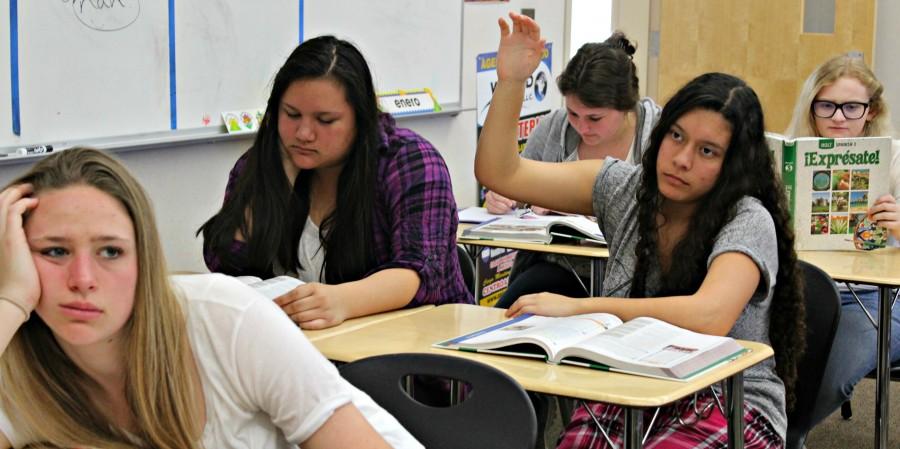Participation grades are unfair, ruins grades
Students irritated by the enforced participation grades
Participation grades are a major part in a high school student’s grade. They can affect whether they get an A or a B. It can affect Whether they pass or fail. It can also affect the overall GPA.
I can easily understand the main purpose of a participation grade. It can help give students who are failing the boost they need to pass. It can push the slackers of the classroom to participate It can raise that hardworking student’s grade to an A. And when you think of those variables, why would anyone want to get rid of participation grades?
Because while they can also raise a grade, they can easily destroy one.
Yes, just like any other grade from a test, quiz or homework assignment, those teenagers who are anxious to speaking in class, have fears of imperfection or just don’t feel comfortable talking in front of their peers get their grades docked because their teachers feel “They don’t talk enough.”
I cannot tell you how many times I have gotten a B in a class simply because my teacher thought that “I needed to talk more” or that I was “too shy.” It is the most degrading thing I experience as a student, knowing that I study hours and do every homework assignment, only to get a B instead of that A that I know I deserve simply because of one teacher’s biased opinion on my social skills, or lack of.
While it is important for teenagers to develop social skills and learn to speak properly in a social setting, it is not the teacher’s job to put such a task into their own hands and pressure students into uncomfortable situations that can endanger their learning. It’s the student’s job to develop those skills themselves and get help from who they choose. Teachers are meant to teach us, not coach us on our social skills. A statistic from Creating Extraordinary lives stated that 25 percent of teenagers suffer from an anxiety disorder. So if Theoretically 25 percent of the class is having their grades docked because of an insecurity and possible mental illness, why are we still keeping participation grades when they don’t work?
Well, because they supposedly help the other 75 percent.
But the question is, why should students even need participation grades? If you want to pass a class, there are plenty of opportunities to do so. At this day and age, there are so many ways to get help if you are struggling in a class, such as tutors, intervention appointments with your teachers, actually doing homework and actually studying before tests. There is also an infinite amount of online help for every subject you could possibly think of.
And the main point of participation grades is to get students to participate, right? But only good communication and comes from voluntary feedback. If students feel compelled to speak in class just so they can get the grade they want, then they may just say things that are redundant and don’t mean anything just to get credit. This can lessen the educated and make class less engaging for students, taking away the drive for learning. So in reality, participation grades backfire. Instead of engaging the class, they do the exact opposite.
In reality, there is no need for participation grades. if we have teachers handing out free A’s to people who don’t work equally as hard as the people who do, then it kills motivation and deteriorates self esteem. And while the participation grade may not affect that 75 percent, it flips the world upside down for that 25 percent.
While participation grades may enforce participation, they may enforce the wrong kind of participation as well. Students are only going to participate because it’s for a grade, not because they actually have any solid questions or any real input to the conversation.
Participation grades are useless. They make the learning environment dull and stressful. no one deserves to stress every day about having to force themselves to speak out of fear.
by MADISON HUCKABAY






